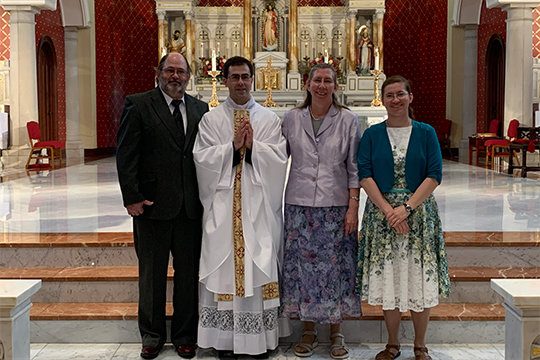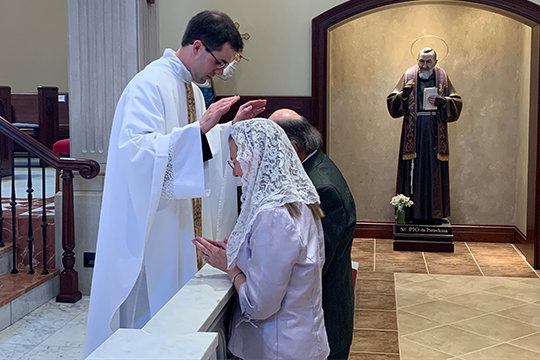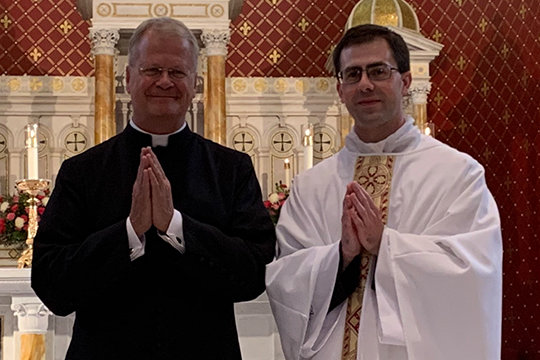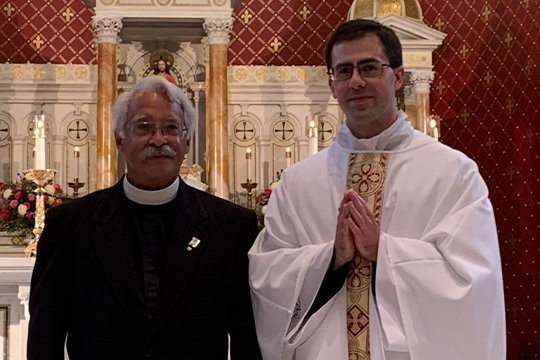Ewing native Fr. Mudd eager to serve as agent of God’s mercy

Someone asked Father Nathan Mudd whether he would be rather be a great preacher or a great confessor.
He chose being a great confessor.
“That’s where people get brought back to God,” he said. “With preaching, they get moved to go to confession. Confession finishes it off.”
Fr. Mudd, who grew up in northeastern Missouri and went to daily Mass in Queen of Peace Church in Ewing during his childhood, was ordained a priest of the Congregation of the Fathers of Mercy on June 6, in the Chapel of Divine Mercy in Auburn, Kentucky.
Joining the ordaining prelate, Bishop William F. Medley of Owensboro, Kentucky, and Fr. Mudd at the altar were Father William Korte, administrator of St. Joseph parish in Louisiana and the Mission of Mary Queen of Peace in Clarksville, and Father Richard Frank, a retired priest of the Jefferson City diocese.
Both are friends of Fr. Mudd and his family.
Father Jean-Baptiste Rauzan (1757-1847) established the Fathers of Mercy in France in 1808 to bring fallen-away Catholics back to the Church in the aftermath of the French Revolution.
They preach parish missions and retreats and invite people back to the Sacrament of Confession and active participation in the life of the Church.
“We preach the truth of God’s love and mercy and His desire to forgive our sins,” said Fr. Mudd.
Their international headquarters is located near Bowling Green, Kentucky.
“Medicine for souls”
Fr. Mudd is a son of Lee and Brenda Mudd, who are now members of St. Joseph parish in Louisiana.
The family moved to a farm near Ewing in the northeastern part of the diocese when Fr. Mudd was in second grade.
Mrs. Mudd home-schooled Nathan and his sister Anna through elementary and high school.
“We prayed together as a family quite often,” Fr. Mudd recalled. “We went to Mass together.”
The family was undergoing a lot of stress when Fr. Korte, a family friend, suggested that they start attending daily Mass.
“He pointed out to us that receiving our Lord in the Eucharist is ‘medicine for souls,’ and that we should start doing that every day,” Fr. Mudd recalled.
Fr. Mudd began serving at Mass when Monsignor David Cox was pastor of the Ewing parish and continued serving through the pastorates of Father Donald Siciliano and Fr. Frank.
Fr. Siciliano would start Mass earlier on Friday mornings.
“Afterward, he would process to the back of church, kneel in the last pew and pray the Divine Mercy Chaplet,” Fr. Mudd recalled. “I remember kneeling next to him, with him still fully vested, and thinking, ‘This is really neat. This is what I want to do when I get older.’”
Kentucky home
Fr. Siciliano and Fr. Frank invited members of the Fathers of Mercy to lead annual missions at the parish.
Father David Wilton C.P.M. led the mission in 2009. He encouraged and challenged the people to make a stronger, deeper personal commitment to Christ and to His Church.
“That was when I really heard the call and thought, ‘I need to go look into this,’” said Fr. Mudd.
Near the end of his senior year, the future priest and his father drove to Kentucky.
“We stayed in a guest apartment and basically lived the life of a Father of Mercy for the weekend,” said Fr. Mudd.
He felt right at home and said he wanted to return in June for postulancy — a six-week period of prayer and discernment before entering the congregation.
“You’re there mostly to see what goes on and to get an understanding of the charism,” he said.
He believes the postulancy and the 18-month novitiate that followed were difficult but necessary. He acknowledges that he had a lot of changing and growing to do.
“I look back on those times and realize that without the grace of God, I would have left within the first three weeks,” he said.
A servant who leads
Novices spend time learning about religious life in general and the work of the Fathers of Mercy in particular.
They also do work around the generalate. Fr. Mudd served as a sacristan — changing out the candles, polishing chalices and ironing altar linens.
Deep prayer and the continued guidance of Fr. Korte helped him to grow in the needed ways.
After a year and a half, he was invited to become a professed member — temporarily vowing to remain detached from earthly possessions, to be celibate and to be obedient to authority under the Constitutions of the Fathers of Mercy.
“Poverty, chastity and obedience freed me to serve God more fully — to give my whole self to God in all that I own, in all that I want to do or not do,” Fr. Mudd noted.
He also received a badge, the emblem of the community and final piece of the habit.
It depicts the Prodigal Son and his forgiving father (Luke 15:11-32).
“Our founder wanted us to be like the father in the parable,” said Fr. Mudd.
He emphasized that these vows don’t make him holier than people who get married.
“In fact, I know married couples who are much holier than I am,” he said. “And I get to go serve them — not as a ‘noble leader’ but as a servant who leads.”
Totally consumed
Fr. Mudd then spent some time on the road with priests who were giving parish missions.
“For the first time in my life, I got to see a mission from the priest’s point of view instead of the laity point of view that I grew up with,” he said.
He had never realized how much of a priest’s energy is consumed by preaching and hearing confessions.
“I saw how they came back to the rectory completely exhausted,” he said. “But I also saw the great joy that they had in preaching the Gospel and being agents of God’s mercy. People were coming back to the faith or learning to appreciate it more.”
Members of the Fathers of Mercy profess temporary vows for three to six years while discerning whether to make those vows permanent.
Throughout that time, “the superior general and the general council are looking for signs that you’re growing in maturity and spirituality, and that you’re willing to keep growing in that,” said Fr. Mudd.
They invited him to make his final profession during the summer of 2015.
“The ritual emphasizes the sacrificial holocaust, the entire offering of oneself,” he noted. “So before you make your profession, just like in an ordination, you lie prostrate on the floor before the altar during the Litany of Saints.”
Fr. Mudd remembers being face-down on the floor, silently asking God, “Do I have the strength to profess perpetual vows?”
God gave him the grace to stand up and say “yes.”
Full circle
He studied for two years at Holy Apostles College and Seminary in Cromwell, Connecticut, followed by philosophy studies at The Athenaeum of Ohio in Cincinnati and Thomas More College in Crestview Hills, Kentucky, followed by theology at the Athenaeum.
He was ordained a transitional deacon, 2019 and was assigned to assist at a local parish each weekend and occasionally preach a homily.
Fr. Siciliano, for whom Fr. Mudd had served at Mass in grade school, had moved to the Cincinnati archdiocese to be closer to his family.
He invited Fr. Mudd to preach and help out at his parish.
“Praise God, it was a huge blessing!” said Fr. Mudd.
Finally, after 10 years of study and preparation, Fr. Mudd received the formal call to priestly orders.
For the third and final time, he lay prostrate before the altar while priests, fellow seminarians and congregants chanted the Litany of Saints over him.
“Asking the Communion of Saints to pray for me, to intercede for me, asking God to pour down His graces on me so that I may receive this sacrament worthily and be His victim in Christ worthily — that’s something I’ll always remember,” he said. “Especially whenever I genuflect on that same spot when I process into the chapel for Mass.”
He’s gotten to spend more time in the past year with Fr. Korte, Fr. Siciliano and Fr. Frank than he did over the past 10 years.
Fr. Korte and Fr. Frank concelebrated Fr. Mudd’s Mass of Thanksgiving the Chapel of Divine Mercy in Auburn, Kentucky.
Fr. Korte preached the homily, which focused on how a priest is a spiritual father to those he ministers to.
On Father’s Day, which was also the Feast of the Immaculate Heart of Mary in the Jefferson City diocese, Fr. Mudd returned to Queen of Peace Church in Ewing to offer Mass with Fr. Frank and Father Robert Fields, canonical administrator of the parish.
“The last time I was in Ewing with Fr. Frank, I was serving Mass for him,” Fr. Mudd said with awe. “To be back there with him as a fellow priest was really neat.”
Standing in line
Fr. Mudd has been appointed associate pastor of St. Helen parish in Glasgow, Kentucky, in the Diocese of Louisville.
Leading missions and retreats will come later.
“The parish assignment is given to help us gain experience in hearing confessions and preaching and finding out what parish life is all about, so that on a mission, you can understand some of the dynamics that you’ve been asked to go preach about,” he said.
He summed up the core of his preaching: “Being children of God, as baptized Catholics, we are adopted sons and daughters of God. And because of that, we have to act as His children. That means living morally upright lives and also bringing others to be His children — bringing others into the Church.”
He speaks of the importance of laypeople serving as apostles, sent out to proclaim the Good News with their lives.
“There are so many opportunities that we miss out on to act like Christ in the world,” he said. “One example I use is the self-checkout line in the store.”
It may be faster and easier than waiting in line for a live cashier, “but I also don’t get the chance to show the patience and love of Christ to others by patiently waiting in line, and talking to the cashier,” he noted.
Burdens lifted
Fr. Mudd asks for prayers for the insight, wisdom and holiness to serve God well as an agent of Christ’s mercy in the Sacrament of Reconciliation.
“It fills me with awe and trembling to think that I will dispense God’s mercy to all those who are seeking it,” he said.
He urges people who avoid sacramental confession out of fear or indifference to return to the fount of grace and reclaim the freedom of God’s mercy.
“It’s an amazing gift from God and I want others to experience that great sense of liberation from all of those burdens that comes when the absolution is given from the priest,” he said.
Comments
Other items that may interest you
Services
The Catholic
Missourian
2207 W. Main St.
Jefferson City MO 65109-0914
(573) 635-9127
editor@diojeffcity.org









